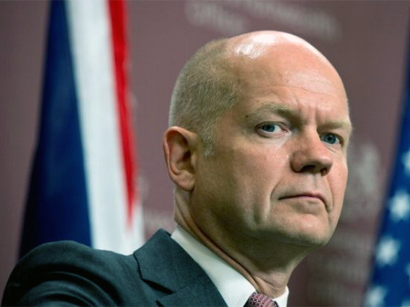William Hague has warned Russia that it faces long-term "isolation and stagnation" over the crisis in Ukraine, BBC reported.
The foreign secretary said it was time to consider a "new state of relations" different to that of the past 20 years.
This could include Russia being outside some international organisations and having less influence over the rest of Europe, Mr Hague said.
Writing in the Sunday Telegraph, he said the UK and its European allies would not "run scared".
Amid continuing tensions in Crimea, where Russian troops have stormed Ukrainian bases, he accused Russia of "bullying" behaviour, which belongs to "a wholly different era".
'Most serious risk'
"The illegal annexation of Crimea is an outrageous land grab, and the referendum that preceded it was a mockery of democracy," wrote Mr Hague.
"Russia has invaded a fellow European nation, and used force to change its borders.
"This is the most serious risk to European security we have seen so far in the 21st Century.
"Vital principles are at stake, including the territorial integrity of European nations and the right of democratic countries to choose their own future."
Earlier this week, Mr Hague announced the UK was suspending all arms export licences and military co-operation with Moscow after President Vladimir Putin signed a treating absorbing Crimea into Russia.
Moscow has said it is protecting the rights of Russian-speaking people in Crimea following the change in government in Ukraine last month and after a referendum recorded 96% support for the region to join Russia.
Sanctions on Russia are not intended to punish its people, but send a message to its leaders, Mr Hague said in the Telegraph.
He added that the European Commission was working on more far-reaching economic measures that could be imposed.
'Lasting restrictions'
Mr Hague urged Russia to make efforts to resolve the dispute in a peaceful manner, writing: "We have never given up on diplomacy or sought a path of permanent confrontation with Russia.
"But nor should European nations run scared before bullying behaviour.
"Despite our preference and our work to improve relations with Russia this means, sadly, that we and our allies must be prepared to contemplate a new state of relations with Russia that is very different to the last 20 years.
"This would involve Russia being outside some international organisations, facing lasting restrictions on military co-operation and arms sales, and having less influence over the rest of Europe."
He said that Russia stood to lose "a great deal over time" and that it had badly damaged its reputation as well as alienating "the great majority of Ukrainians".
This could lead to Russia's role in world affairs turning to "isolation and stagnation", the foreign secretary wrote.
Mr Hague added: "Accelerating energy diversity in Europe may have to be part of our answer to recent events."
'Greater energy security'
Using a broader mix of energy, including controversial fracking schemes, could be one of the methods used to reduce Russia's power, according to Mr Hague.
He said ideas were being discussed in Europe about how to "build greater energy security".
"If necessary, we should be prepared to diversify future sources of natural gas supplies to Europe, including through the Southern Corridor," he wrote.
"We would need to boost investment in gas interconnections and terminals in Europe, and develop indigenous European energy supplies for countries wishing to develop their own resources, such as shale gas.
"And it would mean helping Ukraine and neighbourhood countries to liberalise their energy markets, increase energy efficiency and ensure more resilient energy supplies.
"Russia's actions in Ukraine should make it much more likely that the European Union takes such decisions."
Mr Hague's warning comes as the Foreign and Commonwealth Office extended its travel warnings in eastern Ukraine. It is now advising against all but essential travel to the regions of Kharkiv, Donetsk and Lugansk due to increased tensions.






